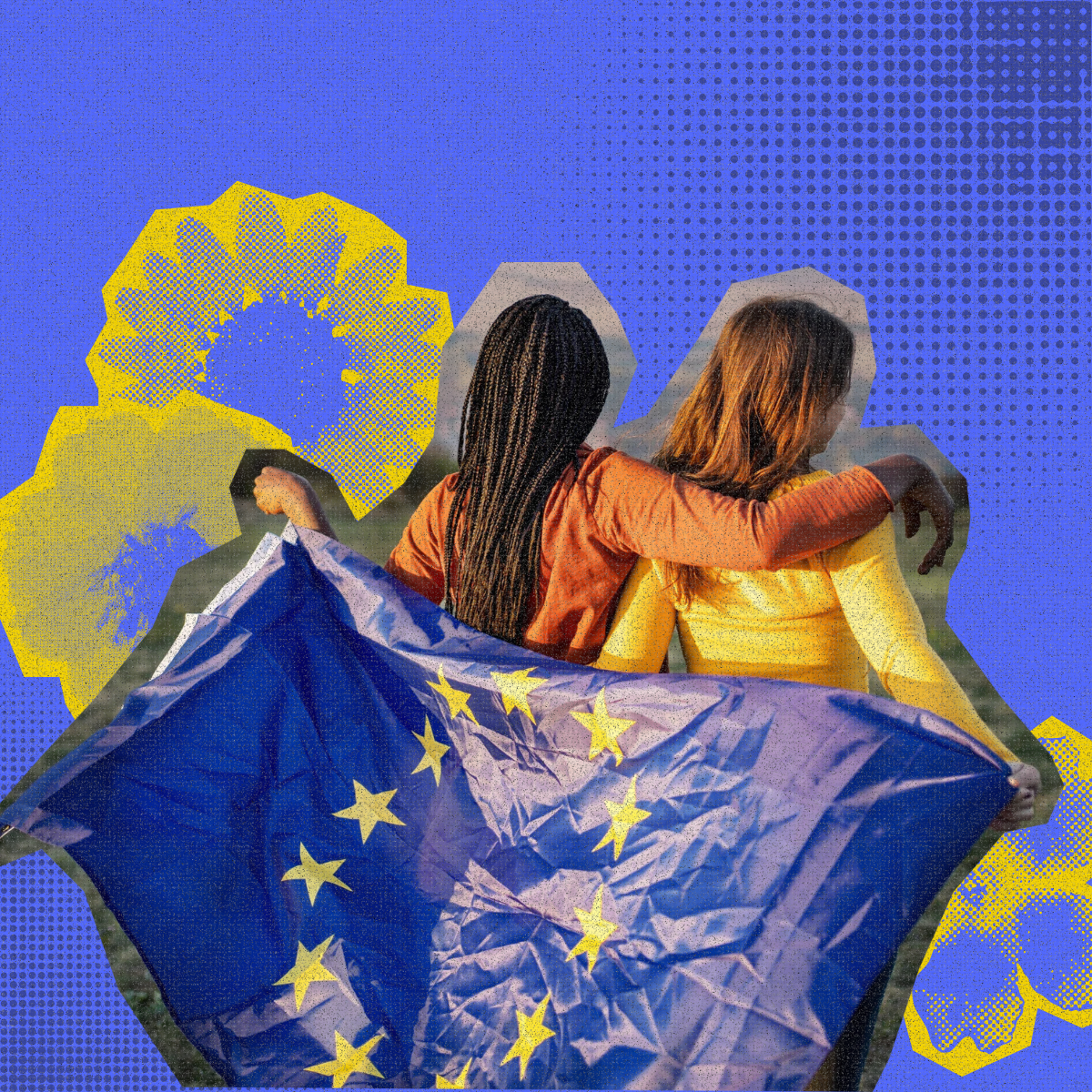The Multiannual Financial Framework (MFF) determines on what the EU spends money over a 7-year period. The upcoming 2028–2034 MFF will shape the future of EU investments in areas like sexual and reproductive health and rights (SRHR), gender equality, and support for civil society organizations (CSOs).
The European Union has made commitments to uphold SRHR, gender equality and support a thriving civic space in line with its democratic values. Policies must be backed up by adequate funding. This is why the MFF is critical.
What is the EU MFF ?
The EU MFF is the EU long-term budget, establishing funding priorities and budget allocations for each priority for seven years.
The European Commission published in July 2025 its proposal for the next MFF.
TThe MFF is divided into different spending programmes, which reflect different areas of EU policy. A number of programmes are particularly crucial for SRHR. The most crucial for international partnerships is Global Europe which channels significant Official Development Assistance (ODA) to countries in need and supports EU values globally. Within the EU, a new expanded programme “AgoraEU” contains a strong CERV+ strand (Democracy, Citizens, Equality, Rights and Values) which is key for the protection of fundamental rights and equality and supporting civil society in Europe.
In the past, CERV grants have allowed CSOs in Europe to:
– Combat sexual and gender-based violence and assist survivors of domestic violence
– Combat racism
– Advance the rights of women and the LGBTI community
– Safeguard an independent justice and democratic freedoms
And the previous iteration of Global Europe has contributed worldwide to:
– Improving global well-being, reducing inequalities, and combating poverty
– Supporting safety for all regardless of where they live, how much they earn, or who they love
– Combating sexual and gender-based violence, including FGM
– Providing education on reproductive health as a way to broaden training opportunities for girls and nurture their self-esteem
– Education reforms that were meant to prevent early child marriage
The current proposal for the 2028–2034 MFF & our analysis
The budget for EU External Action – Global Europe
Global solidarity in the next MFF
The European Commission’s proposal for the new Global Europe instrument under the 2028–2034 MFF allocates €200 billion to international cooperation, with an additional €100 billion earmarked for Ukraine.
All people deserve to live with dignity and humanity. It is only right that everyone can choose whether and when to have children, to be who we are and love who we love, and for our children to be taught about having safe, healthy, and happy relationships. We have the collective moral obligation to work with people around the world to build communities in which everyone can flourish and thrive.
While Global Europe retains language on gender equality, SRHR (Article 9), and civil society support, these priorities are overshadowed by a pivot toward economic, migration, and security objectives.
The proposal also introduces more flexibility across the MFF, meaning that even this entire €200 billion might not stay in the Global Europe Instrument budget as part of it could be reallocated to other instruments, with as it stands, unclear safeguards in place. Moreover, several Member States have already expressed that the external budget is too high—raising the likelihood of cuts before final adoption.
The new design emphasizes flexibility, geographisation, and alignment with EU interests. This results in funding being already shifted away from regions with the greatest needs—especially sub-Saharan Africa—towards candidate countries and the neighbourhood, often with a focus on migration control.
While CSOs and local authorities are recognized as key actors, they are mostly referenced in the context of human rights and civic space. This narrow framing risks excluding CSOs from broader implementation roles and sectors.
Although the regulation still refers to the SDGs, human rights, and the Samoa Agreement, the absence of gender and human development targets and the dominance of EU strategic interests signal a challenging road ahead. There is still much to fight for in protecting the level, direction, and accessibility of funding under this new instrument.
Our asks:
- Protect funding levels for external action—no backsliding
- Reintroduce clear targets for gender equality and human development to ensure funding for these essential priorities and guarantee accountability
- Lock in safeguards to prevent funds from being diverted from essential services such as SRHR to EU-centric priorities
- Put global solidarity and human rights first, not migration control or EU self-interest
- Make SRHR a priority across all regional programming
Read more
The budget for the CERV+ strand (Democracy, Citizens, Equality, Rights and Values) in the next MFF
Most of us want to live in open, democratic, equal and inclusive societies, where the rule of law and everyone’s rights are respected. We want to feel safe from discrimination, free from violence and coercion, heard by our elected officials, seen and respected. This is what the CERV Programme – that stands for Citizens, Equality, Rights and Values Programme – is all about. It is the European Union’s flagship funding instrument to protect and promote Union rights and values as enshrined in the EU Treaties and the Charter of Fundamental Rights.
The CERV programme provides funding to civil society organizations and other groups for activities such as providing services, training, building skills, sharing good practices between EU countries, contributing to the common good through advocacy activities, and acting as watchdogs to hold those in power accountable. It also helps strengthen important EU-wide networks, like the Equality Bodies Network, by supporting their yearly work plans.
In the European Commission’s recent proposal for the next MFF, two existing programmes would be merged: CERV and Creative Europe, to create ‘AgoraEU’. Whilst we would have preferred CERV to remain a stand-alone programme, it seems that the CERV+ strand of AgoraEU would retain the essence of CERV.
CERV+ has been allocated a budget of €3.593 billion (out of the total MFF budget of €2 trillion), representing more than a doubling of the current CERV budget. CERV+ would also remain under direct management by the European Commission, which is key for its independence.
This bolstered budget, and maintaining the essence of the programme, is particularly important at a time when rights and democracy are under attack.
CERV+ recommits to key objectives of protecting fundamental rights, equality and combatting discrimination, in line with core EU values outlined in the EU treaties and the Charter of Fundamental Rights. CERV+ would notably continue to prioritise the advancement of women’s rights and LGBTIQ people’s rights, and the fight against gender-based violence, violence against children and other groups at risk. The objectives of supporting democracy and respect for the rule of law have been further developed, including to nurture a vibrant civic space and combat disinformation.
In addition, the European Commission has proposed a horizontal condition of respect for the rule of law and fundamental rights across all the programmes of the MFF, which is an important step to ensuring EU money is spent in line with its laws and values and violations of fundamental rights are sanctioned.
Our asks:
- Ensure that CERV+ remains values-driven and fit for purpose to continue to support civil society and defend all values holistically – including gender equality, women’s rights and SRHR
- Safeguard the proposed budget for CERV+, and ensure an increased and fair allocation of funds to gender equality, women’s rights, LGBTIQ rights, and combating GBV
- Protect funding for advocacy and watchdog work – these are essential for CSOs to uphold rights and democracy
- Continued multiannual core funding through operating grants, and regranting to smaller organisations
Read more
Where can the money come from? The EU own resources proposal

Let’s remind ourselves: the money is there—but priorities lie elsewhere. When something is deemed a priority, the money follows.
We must be sharper in exposing the myth of scarcity. It’s not a question of resources—it’s a question of political will.
We need to recognize that true security includes human safety, health, rights, and dignity for all. Instead of shielding extreme wealth, subsidizing luxury air travel, and protecting the enormous profits of fossil fuel giants—and instead of taxing menstrual products while exempting Viagra, which perpetuates gender inequity in tax policy—leaders must re-align their priorities. Because where priorities go, funding follows.
What are our priorities for the next MFF

- Ensure equal access to funding for grassroots, feminist, youth-led and community-based CSOs—inside and outside the EU
- Keep international cooperation focused on solidarity, not EU self-interest
- Prioritise SRHR, gender equality, and human development under Global Europe, with targeted, sustained funding
- Secure strong AgoraEU support for CSOs and (W)HRDs advancing women’s rights and SRHR
- Use the new European Competitiveness Fund which includes parts of the previous EU4Health instrument, and the European Social Fund + to tackle health inequalities and expand access to SRHR
What’s next - timeline & negotiations
The negotiation of the MFF is a political process involving three key EU institutions:
– The European Commission presents the budget proposal and priorities (July 2025);
– For specific parts such as Agora EU and Global Europe, the Council and the Parliament decide together on the final version;
– For the overall MFF, Member States decide in the Council by unanimity, while the European Parliament can only approve or reject (from September 2025 until an agreement is reached);







